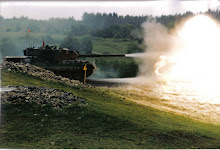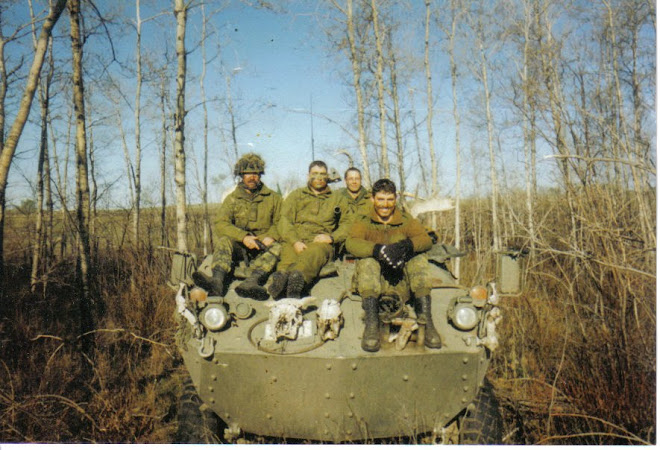Wounded soldiers out, 'fat plugs' kept in
Monday, June 20, 2011
By David Pugliese, Ottawa Citizen
The former veterans ombudsman has come out in support of keeping wounded soldiers in the ranks of the Canadian Forces, saying that the military's Ottawa headquarters is full of "fat plugs" who aren't physically fit but unlike the injured suffer no consequences.
The Canadian Forces says it must follow what it calls the universality of service principle which dictates personnel must be fit to perform military duties and be capable of being deployed on missions.
Wounded Afghan veterans say the military is using that principle to force them out of the Canadian Forces.
But retired colonel Pat Stogran says there is no reason why such combat veterans, who want to continue serving their country, can't do so. He says the universality of service rule makes no sense and the military overlook it when they want to.
"I could walk down the halls of NDHQ and show you people with no medals on their chest who are not deployable, either because they're overweight or because they've got family problems or whatever and no one challenges them," explained Stogran, who was in charge of troops during the 2002 deployment to Afghanistan.
"There are certain things they (the wounded) would readily admit they aren't up to but there are still all sorts of jobs that some fat plugs at NDHQ who are not deployable, who are not universally fit for service, are now doing."
Stogran says a greater principle should be at play and that is one of taking care of those who have made significant sacrifices for their country and want to continue serving the nation.
The federal government is currently being sued by Ryan Elrick, a 38-year-old former soldier who had his legs blown off by a roadside bomb in Afghanistan in 2006.
He was retrained to be an intelligence analyst in the Canadian Forces, and had been praised by officers for his performance in that job.
But in documents filed in Manitoba Court of Queen's Bench Elrick alleges he was forced out of the military in March because the Canadian Forces determined his disability made him unfit for service. Elrick stated the military determined he was in violation of the universality of service policy.
Rear Admiral Andy Smith, chief of military personnel, says no soldiers are being forced out. Smith says the Forces are prepared to offer wounded veterans jobs either training cadets or providing administrative work for that organization. In addition, there are jobs supporting the Canadian Rangers, a reserve force that operates in the Arctic.
No jobs would be offered with the regular forces, though.
If that is not of interest, the Canadian Forces helps prepare the wounded to transition to civilian life. "If anything we are being extremely compassionate, respectful in treating people in a dignified manner, to help them deal with the terrible things that have happened to them," Smith said.
The files of 40 wounded soldiers are being reviewed by the military.
In a previous interview Smith said individuals who can't pass fitness tests because they are overweight are provided with help. But ultimately they too would be removed from the Canadian Forces if they cannot meet the universality of service conditions, he added.
However, some serving soldiers have disputed that, noting there are overweight individuals or those who have family issues and as a result have been quietly exempt from serving overseas.
Both Stogran and Elrick point out that attitudes toward the wounded are much different in the U.S. military. In an undated article about the U.S. army's amputee patient care program, Dr. Jeff Gambel, of the Amputee Coalition of America, noted that "today's military amputee who wishes to remain on active duty commonly finds a more receptive atmosphere, if not strong encouraging support from their chain of command."
Such support, writes Gambel, is "well-founded given advances in amputee care that make it possible for amputee service members to effectively meet and exceed rigorous performance standards for a wide range of military occupations."
Gambel pointed out that two U.S. generals, who returned from the Vietnam War as amputees, were allowed to continue on in their careers and recently retired after full, active-duty careers.
Stogran also highlighted the major advancements made in prosthetics and said wounded Canadian Afghan veterans have shown they are physically fit, running marathons and taking part in other sports activities.
Smith acknowledged that some of the wounded have made great strides in their rehabilitation. But he added: "It's more than just being able to run a marathon. You have to do all the various fitness tests we prescribe to effectively measure their fitness in relation to the universality of service principle."
Smith said the issue should also not be influenced by the argument that the numbers of wounded are relatively small, so the Canadian Forces could easily find a place for them in the regular ranks. The universality of service principle overrides that, he added.
But Stogran said the real problem is that senior military commanders have slipped into a bureaucratic mindset. "I'm sure if you talked to the young warriors who work with these wounded guys, they'd say, 'sure I'd soldier alongside these guys anytime'," Stogran explained.
"It's when it gets to the paper pushers at NDHQ that things change."
Tuesday, June 21, 2011
Subscribe to:
Post Comments (Atom)




No comments:
Post a Comment